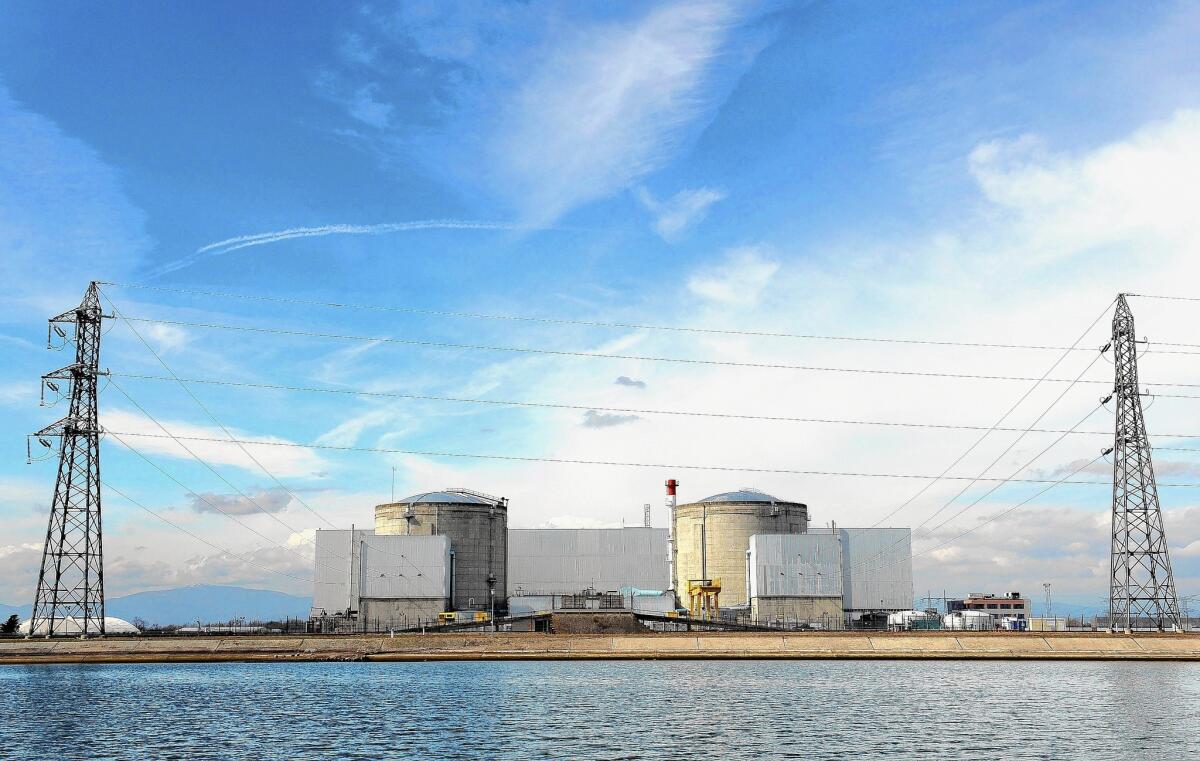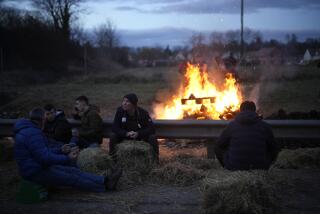Pressure builds against France’s ban on fracking

Reporting from PARIS — Deep beneath the City of Light lies what some believe to be an energy bonanza ripe for harvest.
If the rosy forecasts are correct, France is sitting on one of the biggest deposits of shale gas in Western Europe, enough to supply the country for decades and even some neighboring ones as well. French companies such as energy giant Total already boast the know-how for conducting the hydraulic fracturing, or fracking, needed to extract the natural gas.
There’s just one hitch: Fracking is forbidden in France. And the current government has pledged to keep it that way.
French officials side with those who consider fracking dangerous and environmentally damaging because of its deep-bore drilling and use of high-pressured, chemically treated water to blast apart rock to release the gas trapped inside. Backers of the ban say that estimates of French shale gas reserves are wildly optimistic and that the focus should be on reining in fossil fuel consumption, not encouraging it.
But the energy industry warns that France is making a big, and costly, mistake.
At a time when Europe is talking urgently of the need to decrease its reliance on imported gas from a newly muscular Russia, to ignore a possible major source of energy here at home is inexplicable, critics say. The French government has outlawed not just exploitation but even exploration of potential shale gas reserves, making an informed debate on what’s out there and what to do with it impossible, energy executives complain.
“The fact that fracking is banned puts a lid on everything,” said Jean-Louis Schilansky, president of the French Union of Petroleum Industries. “France is at a standstill, which could be, in the long term, a real problem.”
France is the only one of the European Union’s 28 nations besides Bulgaria to ban fracking for shale gas, although some other countries have adopted a cautious wait-and-see attitude. By contrast, across the English Channel, the British government has announced enthusiastically that it is going “all out for shale” and issued numerous permits for prospecting.
This has given rise to what Schilansky calls a “strange state of affairs,” in which French energy companies have invested millions of dollars in other countries such as Britain in pursuit of an activity they’re prohibited from undertaking in their own.
But environmentalists note that popular opinion in France is strongly against fracking — as high as 80%. That’s greater than the opposition to nuclear energy, which provides most of France’s electricity.
Both sides of the debate agree that public sentiment has been heavily influenced by the controversial 2010 documentary “Gasland,” which blamed fracking for polluting groundwater in the United States. The Oscar-nominated film, which famously shows a Pennsylvania man lighting the water from his tap on fire, struck a chord with the French, who cherish their tracts of unspoiled countryside and pride themselves on having given Evian and Perrier to the world.
“The costs are a thousand times worse than the benefits,” said Benoit Hartmann, spokesman for France Nature Environment, an umbrella organization of environmental groups. “In Texas, you do digging, and it’s culturally accepted. But here it’s not like this. People say, ‘It’s our land; it’s our richness.’”
The U.S. Energy Information Administration estimates there could be nearly 4 trillion cubic meters of gas, about 80 times France’s current annual consumption of roughly 50 billion cubic meters. Most of the reserves are believed to lie beneath the Paris Basin, in northern France.
But critics say that the figure is little more than a guess since no comprehensive study has been conducted and that, in any case, not all the trapped gas would be extractable. They cite the example of Poland — the only EU country thought to harbor a larger shale gas supply than France — where colossally high estimates have been consistently revised downward. Some energy companies that rushed to lay their hands on prospecting licenses in Poland have begun pulling out in disappointment.
The energy industry argues that France should at least allow an assessment to be performed to lend context to public debate.
“The key is to evaluate how much there is,” Schilansky said. “As long as we’re not doing that, it’s [just] throwing arguments about, like philosophy.”
What’s not in dispute is the fact that, at present, France relies on other countries for almost all of its natural gas, importing it from Norway, the Netherlands and northern Africa.
Though it also receives some from Russia, France is less dependent on Russian supplies than other European countries, such as Germany and Italy. That may have fostered a lesser sense of urgency here than elsewhere in Europe of the need to develop domestic sources.
Yet as a leading member of the EU, which has made weaning itself from Russian gas a priority since Moscow’s annexation of Ukraine’s Crimea region, France is under pressure to be part of the solution. An EU energy strategy report released last month emphasized the need to pursue alternative, homegrown sources of gas.
“If we don’t want to be overdependent [on Russia], then we will have to do anything we can to meet our own energy needs,” said Thierry Bros, senior European gas analyst for Societe Generale in Paris. “We have no silver bullet ready to fire today. It’s going to be a very lengthy and possibly costly process.”
Advocates of shale gas say it offers a good transition for countries trying to reduce oil consumption and to increase cleaner fuel sources such as solar and wind, which currently account for a negligible, and usually quite expensive, portion of most nations’ energy supplies. Currently, 75% of France’s energy comes from nuclear power — the most of any advanced nation. About 15% is derived from renewable sources and the rest from fossil fuels.
France’s fracking ban may become politically harder to sustain if Britain successfully taps its reserves and starts seeing its gas prices drop. That would leave French industrialists wringing their hands over the high cost of doing business at home and bemoaning France’s loss of competitiveness.
“My guess is that we are going to wait for the U.K. to see how they’re doing it. If the U.K. can do this in a profitable and environmentally efficient way, then France will have few options,” Bros said. “If you have companies leaving your country because of energy prices, you have to look at a Plan B.”
The prohibition on fracking was enacted in 2011 by the conservative government of President Nicolas Sarkozy amid the wave of anti-fracking hostility that caught the energy industry flat-footed.
“We were completely overwhelmed,” Schilansky acknowledged. “It was a kind of blitzkrieg. It started in February, ‘Gasland’ was [broadcast] in March or April, and the law was passed in July. It was extraordinary.”
A few prospecting permits that had already been issued by the government were suddenly revoked, drawing protests and a lawsuit from one of the companies. A high-court ruling last year struck down the suit.
Sarkozy’s Socialist successor, Francois Hollande, has promised to maintain the embargo as long as he is president, which, given his record low approval ratings, might be only through the end of his current term, in 2017.
Despite his stated opposition to fracking, Hollande’s administration has sent mixed signals. His economy minister has suggested that shale gas is worth exploring, and the new environment minister — Hollande’s fourth in two years — recently said of fracking that, “if new technologies that aren’t dangerous emerge, why not?”
Such equivocation alarms environmentalists intent on keeping France fracking-free.
Although public opinion is in their corner, they’re aware that the energy industry is lobbying politicians to allow at least some preliminary exploration and investment during a time of deep economic malaise in France.
“We know that the arguments that our opponents make are strong,” said Hartmann of France Nature Environment. “We know that when you face a crisis like we are now, it’s more efficient to argue that you’ll create jobs, that you’ll reduce your dependency, that you’re sitting on a gold mine.”
But he believes that France’s natural beauty, the health of its people and the future of the planet will all be imperiled if energy companies are given free rein to extract shale gas, which remains, after all, a fossil fuel that contributes to global warming.
“We should be careful,” Hartmann said. “We know what the risk is. We can’t take this risk.”
Special correspondent Tracy McNicoll in Paris contributed to this report.
More to Read
Sign up for Essential California
The most important California stories and recommendations in your inbox every morning.
You may occasionally receive promotional content from the Los Angeles Times.











